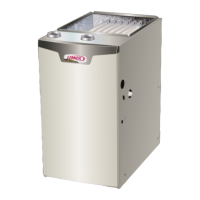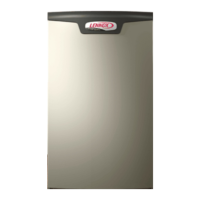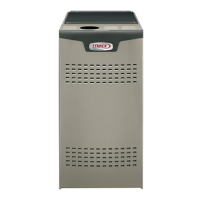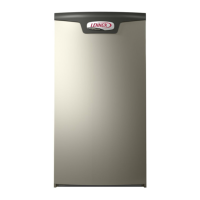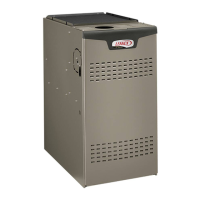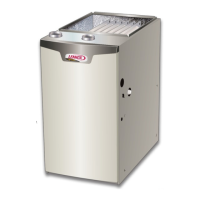Page 10
NOTE - If vent pipe needs to exit from side of cabinet,
use the pilot hole (located on either side of the unit) to
cut a 6” (152 mm) round hole. Attach finishing plate
(provided) with four sheet metal screws to cover rough
edges.
Removal of Unit from Common Venting System
In the event that an existing furnace is removed from a
venting system commonly run with separate appliances,
the venting system is likely to be too large to properly vent
the remaining attached appliances. The following test
should be conducted while each appliance is in operation
and the other appliances not in operation remain con
nected to the common venting system. If venting system
has been installed improperly, the system must be cor
rected as outlined in the previous section.
1 - Seal any unused openings in the common venting
system.
2 - Visually inspect venting system for proper size and
horizontal pitch and determine there is no blockage or
restriction, leakage, corrosion or other deficiencies
which could cause an unsafe condition.
3 - Insofar as is practical, close all building doors and win
dows and all doors between the space in which the ap
pliances remaining connected to the common venting
system are located and other spaces of the building.
Turn on clothes dryers and any appliances not con
nected to the common venting system. Turn on any
exhaust fans, such as range hoods and bathroom ex
hausts, so they will operate at maximum speed. Do not
operate a summer exhaust fan. Close fireplace damp
ers.
4 - Following the lighting instruction on the unit, place the
appliance being inspected in operation. Adjust ther
mostat so appliance will operate continuously.
5 - Test for spillage using a draft gauge.
6 - After it has been determined that each appliance re
maining connected to the common venting system
properly vents when tested as outlined above, return
doors, windows, exhaust fans, fireplace dampers and
any other fuel burning appliance to its previous condi
tion of use.
7 - If improper venting is observed during any of the
above tests, the common venting system must be cor
rected.
Flue Connections
IMPORTANT
When flue pipe is installed at less than minimum
clearance listed in table 2, radiation shields must be
installed. See figure 12.
For front flue models, the enclosed exhaust pipe ring may
be used for pipe to exit the left or right side of cabinet. Cen
ter line marks are provided in cabinet.
Use 24 gauge or heavier galvanized smoke pipe and fit
tings to connect furnace to vent. Connect flue pipe to chim
ney using the least number of elbows and angles possible.
Flue pipe or vent connector must be inserted into the chim
ney so that it is flush with the inside of the vent liner. No re
duction in diameter of flue pipe is acceptable. It is best to
have flue pipe as short and direct as possible. Where two or
more appliances vent into a common flue, the area of the
common flue should be at least equal to the area of the larg
est flue or vent connector, plus 50% of the area of any addi
tional flues or vent connectors. Install the barometric draft
control (provided) and flue pipe according to instructions
packed with control.
Inspect flue pipe annually. Clean soot or ash from flue pipe,
if necessary. If pipe is rusted, replace.
